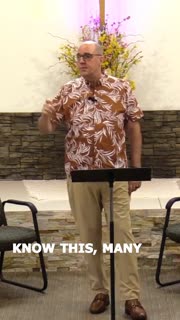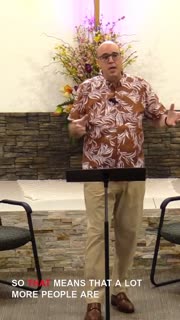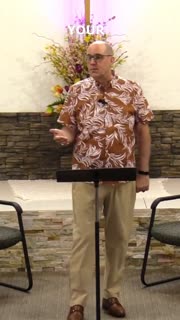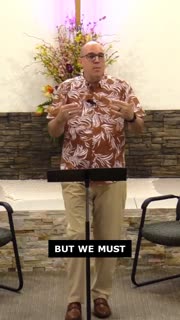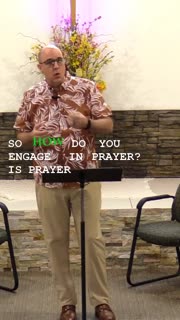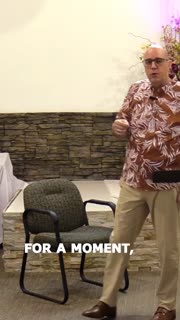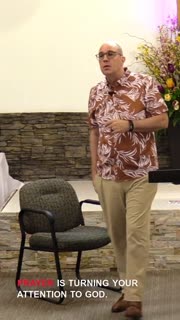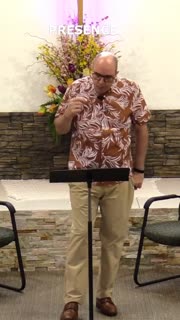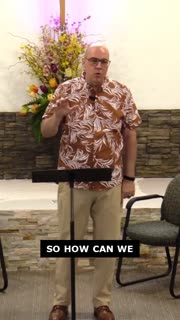Transforming Prayer: A Continuous Conversation with God
Devotional
Sermon Summary
Bible Study Guide
Sermon Clips
1. "But know this, many people around the world pray. Want some numbers? In Canada alone, 42% of the people say that they pray on a regular basis. Doesn't matter what religion, sometimes even irreligious people, atheists, all kinds of people from all kinds of walks of life say that 42% of the time they pray on a regular basis. Compared to 5% of the people that attend church regularly on a Sunday morning." [01:55] (36 seconds)
2. "So that means that a lot more people are praying than actually going to church. A lot more people are praying, and even though they may or may not know how to pray, they know deep inside each and every one of us that there is something greater than us. There's something bigger. And I know that evolution says, right, world came from nothing and there was a big bang and all of a sudden life appeared. But that theory is not true." [02:38] (27 seconds)
3. "Your prayer life is your life. This is not something that you do on the side or when you have time or when you are in trouble. But our prayer life as believers should be our life. What happens now is that we want things and we want God to bless us as we want those things, right? That's not our fault. This is the culture that we grew up in." [03:32] (30 seconds)
4. "But we must know that God is not just that weight that pushes us forward. He is the one that we ought to bow down and submit every time." [04:08] (13 seconds)
5. "Have you ever been in this position? I don't know what to do. But Lord, my eyes are on you. One of the questions that was on the survey, and that is, do you have a place to pray? How often do you pray? How is your prayer life? Do you pray in the morning, afternoon, for how long you pray? All these questions. And the interesting part about it is each and every one of us has a different way to pray." [08:04] (31 seconds)
6. "So how do you engage in prayer? Is prayer something in your life that you do as a chore? Or is it something that you look forward to doing? There's a big difference because most of the time we approach prayer, our prayers in either way, right? It's a chore. I got to get it done. How do you act when you have chores to do at home?" [09:24] (26 seconds)
7. "Just imagine for a moment, if your prayer life was talking to your best friend. Imagine that friend that knows you from your childhood and he says, hey, listen, I'm here at the airport. I got four hours between my connecting flights. I'm going to be there tomorrow from whatever, one to four, come and see me. What would you do? You would probably clear your calendar for that. That afternoon to say, you know what? Here is my best friend. And I want to spend, what? Time with them." [10:36] (32 seconds)
8. "Prayer is turning your attention to God. As I mentioned earlier, everything is about you, right? Your favorite ice cream, your favorite shoe, your favorite car. But now it's like, okay, when I pray, I'm turning the attention away from me and I'm turning it to God." [13:35] (23 seconds)
9. "Prayer is about the presence before it is about anything. Prayer does not begin with our outcome. Prayer is about the presence and not the outcome. Sadly for many of us, it's always what? The outcome. Why do I pray? I want a new car. I want a better job. I want a healthy relationship. I want a healthy body. That's the outcome that I desire. But when we turn our attention to God, it's not about the outcome, but it is about spending time in the presence of our Creator." [14:09] (39 seconds)
10. "So how can we learn how to pray? Are you guys ready? Start. I'll give you a few minutes. Whatever you want to do you ought to start. I don't know how to pray. Start. I want to have this perfect room in my house with the perfect chair with the perfect lighting and no noise from the dogs from the neighbors, from our kids and then I'll start. No. Start now. Just start. Because we know that when we pray we're talking to God." [19:26] (47 seconds)
Ask a question about this sermon
2. "So that means that a lot more people are praying than actually going to church. A lot more people are praying, and even though they may or may not know how to pray, they know deep inside each and every one of us that there is something greater than us. There's something bigger. And I know that evolution says, right, world came from nothing and there was a big bang and all of a sudden life appeared. But that theory is not true." [02:38] (27 seconds)
3. "Your prayer life is your life. This is not something that you do on the side or when you have time or when you are in trouble. But our prayer life as believers should be our life. What happens now is that we want things and we want God to bless us as we want those things, right? That's not our fault. This is the culture that we grew up in." [03:32] (30 seconds)
4. "But we must know that God is not just that weight that pushes us forward. He is the one that we ought to bow down and submit every time." [04:08] (13 seconds)
5. "Have you ever been in this position? I don't know what to do. But Lord, my eyes are on you. One of the questions that was on the survey, and that is, do you have a place to pray? How often do you pray? How is your prayer life? Do you pray in the morning, afternoon, for how long you pray? All these questions. And the interesting part about it is each and every one of us has a different way to pray." [08:04] (31 seconds)
6. "So how do you engage in prayer? Is prayer something in your life that you do as a chore? Or is it something that you look forward to doing? There's a big difference because most of the time we approach prayer, our prayers in either way, right? It's a chore. I got to get it done. How do you act when you have chores to do at home?" [09:24] (26 seconds)
7. "Just imagine for a moment, if your prayer life was talking to your best friend. Imagine that friend that knows you from your childhood and he says, hey, listen, I'm here at the airport. I got four hours between my connecting flights. I'm going to be there tomorrow from whatever, one to four, come and see me. What would you do? You would probably clear your calendar for that. That afternoon to say, you know what? Here is my best friend. And I want to spend, what? Time with them." [10:36] (32 seconds)
8. "Prayer is turning your attention to God. As I mentioned earlier, everything is about you, right? Your favorite ice cream, your favorite shoe, your favorite car. But now it's like, okay, when I pray, I'm turning the attention away from me and I'm turning it to God." [13:35] (23 seconds)
9. "Prayer is about the presence before it is about anything. Prayer does not begin with our outcome. Prayer is about the presence and not the outcome. Sadly for many of us, it's always what? The outcome. Why do I pray? I want a new car. I want a better job. I want a healthy relationship. I want a healthy body. That's the outcome that I desire. But when we turn our attention to God, it's not about the outcome, but it is about spending time in the presence of our Creator." [14:09] (39 seconds)
10. "So how can we learn how to pray? Are you guys ready? Start. I'll give you a few minutes. Whatever you want to do you ought to start. I don't know how to pray. Start. I want to have this perfect room in my house with the perfect chair with the perfect lighting and no noise from the dogs from the neighbors, from our kids and then I'll start. No. Start now. Just start. Because we know that when we pray we're talking to God." [19:26] (47 seconds)
